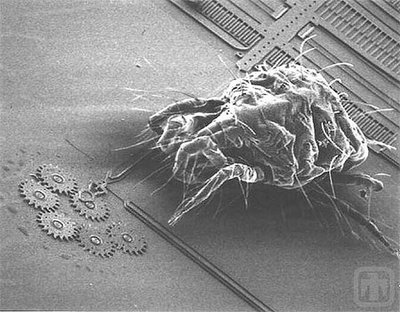Shaving has inflicted more than a few wounds on the human species over the years - not to mention the needless blood loss, and embarrassing mini bandaids used to hide unsightly nicks. Of course, I'm referring to the use of razor blades rather than electric shavers. I gave up electric razors - in my opinion they never give you that skin close shave, and they seem to increase the risk of ingrown hairs. Unfortunately the price both men and women pay for that razor close shave are the unavoidable nicks, cuts, and lacerations despite the technical wizardry that goes into the making of the modern blade.
The blade companies probably have armies of research scientists, engineers, and other geniuses trying to create the perfect blades - using all types of space age metals or alloys, and techniques to make the business end of a blade sharp and smooth at an extreme microscopic level - also using battery powered, vibrating blades (a hybrid electric?) - yet the blood letting goes on - Why? Well, one reason is that razor blades get dull, and lose that perfect edge - this fits nicely into ongoing revenues from blade production and sales, but is it unavoidable or could the companies create an indestructible blade? There must be some combination of iridium, gold, titanium, stainless steel, neptuno-urani-satur-jupitanium etc. that could be forged to make a blade that would last for life - wouldn't be good for razor blade sales though right? Of course you can buy two, three, four, or even
five bladed razors (new from Gillette), and they might shave you a little closer, but still the bleeding continues. I've got it! They should put a thin layer of coagulant (blood clotting factor) along the edge of the blade(s), so it's right there waiting to go to work on any fresh nick. Probably too expensive - OK it's a dumb idea - they can keep using their aloe lubricating strips. It could be that nanotechnology (see recent
Nanotechnology Revolution post) innovation will finally create the perfect cutting razor edge, but again that might not be in the best interest of shaving companies. Unfortunately it's not just blade quality that determines the risk of cuts. Your propensity to bleed also depends on skin thickness and smoothness, hair thickness and distribution, and so on. In addition to using relatively fresh or sharp blades shaving technique is also important. This includes wetting the hair thoroughly to decrease its tensile strength, stroking the razor along the lay of the hair, and frequent rinsing of the razor to decrease debris near the blade surface. If you would like a thorough scientific discussion of optimal shaving technique presented in the context of prep shaving for operations - the
Derma-Safe company describes this in detail.
This all raises the question, as to why most men continue to shave despite the expense, time, and hazards involved. Of course, there are alternatives besides growing a beard if we borrow examples from ancient times - the following excerpt is from the
Quik Shave site shaving timeline:
"In ROME, many men are following the grooming example of JULIUS CAESAR (101-44 B.C.), who has his facial hairs individually plucked out with tweezers every day. He also writes this same year that "the Britons shave every part of their body except their head and upper lip." In early Rome, POPPAEA, wife of the notorious EMPEROR NERO, uses depilatory creams to remove unwanted body hair on a daily basis. Depilatories are used as an alternative to the bloody mess that results from shaving with a blade. The latest available creams include some pretty wild ingredients, like resin, pitch, white vine or ivy gum extract, ass's fat, she-goat's gall, bat's blood, and powdered viper."
Maybe shaving with a modern razor blade isn't so bad after all.
Tags:razor blades,
Gillette,
shaving,
Fusion razor

